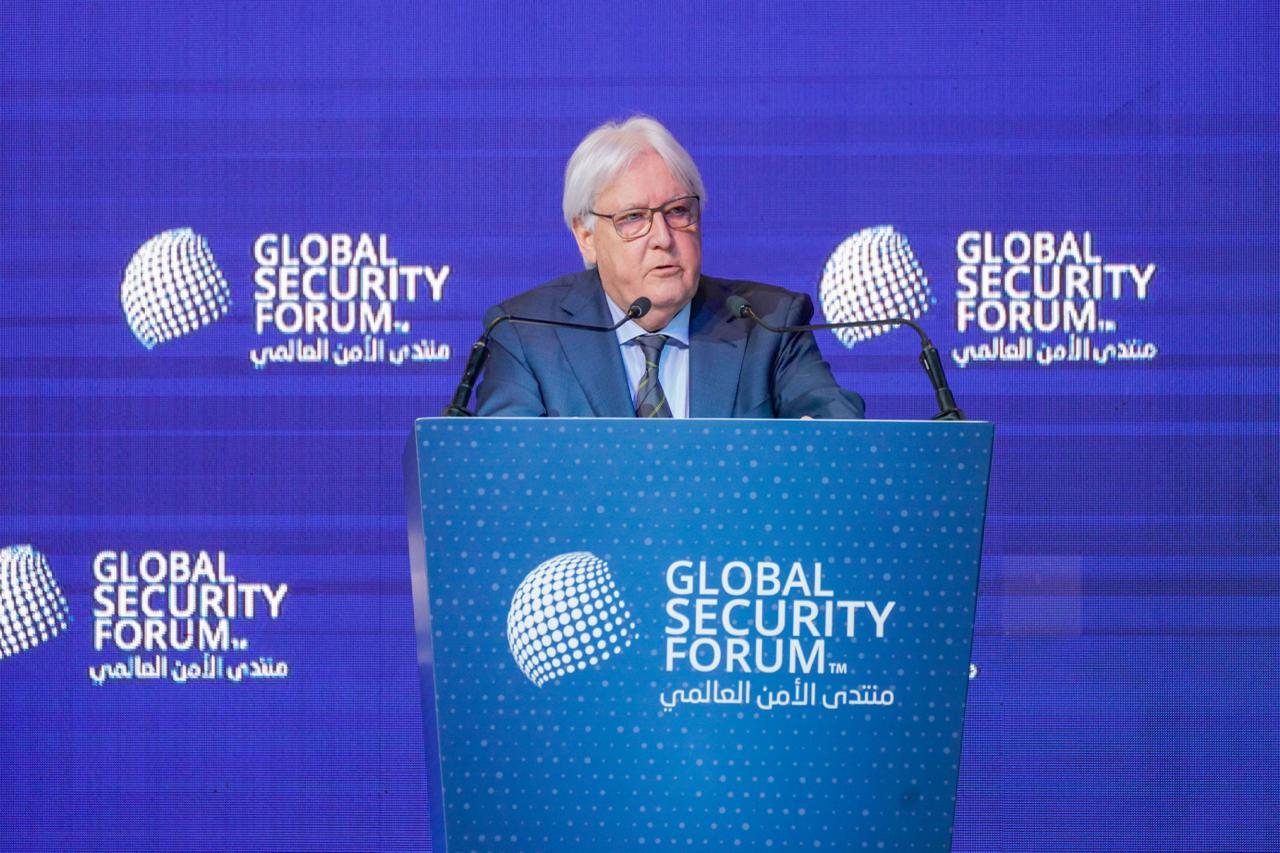Griffiths underlined the crises the world is currently facing, including the wars in Sudan and Gaza as well as the worsening situations in Syria and Yemen.
Martin Griffiths, the United Nations’ humanitarian chief, praised Qatar’s global mediation roles and balancing of diplomacy with its humanitarian efforts in comments made on Monday at the Global Security Forum in Doha.
“I’m somebody who has witnessed firsthand the hand of Qatar in linking its humanitarian assistance, for which I am of course engaged, to the vital priority of resolving conflicts,” said Griffiths.
Griffiths highlighted “Qatar’s actual role in defining” humanitarian diplomacy while thanking the Gulf diplomatic heavyweight.
Qatar has been playing a crucial mediating role between Israel and Hamas since the beginning of the war in Gaza in hopes of reaching a ceasefire and captives’ release deal. Last year, Qatar and Egypt’s mediation led to a week-long truce in Gaza that resulted in the release of 109 captives.
However, the talks have since stalled, particularly since the beginning of the Rafah invasion.
Ongoing global crises
During his remarks, Griffiths underlined the crises the world is currently facing, including the wars in Sudan and Gaza as well as the worsening situations in Syria and Yemen. He noted that the crises stem from “competition and animosity” between nations.
“I have witnessed, as you have, how persistent competition, animosity and aggression between nations has prevented that dream from becoming a reality for far too many people. We have seen the outbreak of unimaginably devastating tragedies and trauma in Gaza and in Sudan,” he said.
Israel waged the genocidal war in Gaza on October 7, 2023, where it reduced the coastal enclave to rubble while killing around 35,456 people. Israel has displaced more than 85 percent of the population while creating another displacement crisis after its invasion of Rafah this month.
“Hundreds of thousands have been displaced, many serially, searching for safety where little safety exists and where hunger and the threat of disease continue to escalate – we have shared publicly our concerns of where the Rafah operation will go,” Griffiths said.
The war in Sudan has also gone on for more than a year since it erupted in April 2023 between the Rapid Support Forces and Sudan’s army.
One year on, the war displaced 8.6 million people, making it one of the biggest displacement crises since the Second World War II, according to the UN.
“People have faced an inferno of brutal violence: we have reports of horrific atrocities, ethnically motivated violence and gender-based violence. Millions have been displaced, and famine is now on the horizon for an extraordinary potentially five million people,”Griffiths explained.
The crisis in Syria has only worsened more than a decade on, whereas the Russian war on Ukraine continued without a ceasefire in sight. As for Yemen, the war is now approaching its tenth year despite multiple efforts aimed at reaching a complete ceasefire.
“Over the last few years, humanitarian needs have grown exponentially. This year, we estimate 300 million people are in need across the globe of humanitarian assistance and of course, we have never come close to that figure before,” he noted.
Despite the multiple crises, Griffiths said that there is still hope, citing a “light of humanity.”
“I do believe there is hope.I have hope because I have the fortunate privilege to see places of darkness and sorrow, and in these places, we also see the light of humanity. And I believe that light still burns brightly,” he optimistically said.
“Humanity will outlive the decisions of bad leaders. Humanity remains the beacon that will drive us all,” he concluded.







